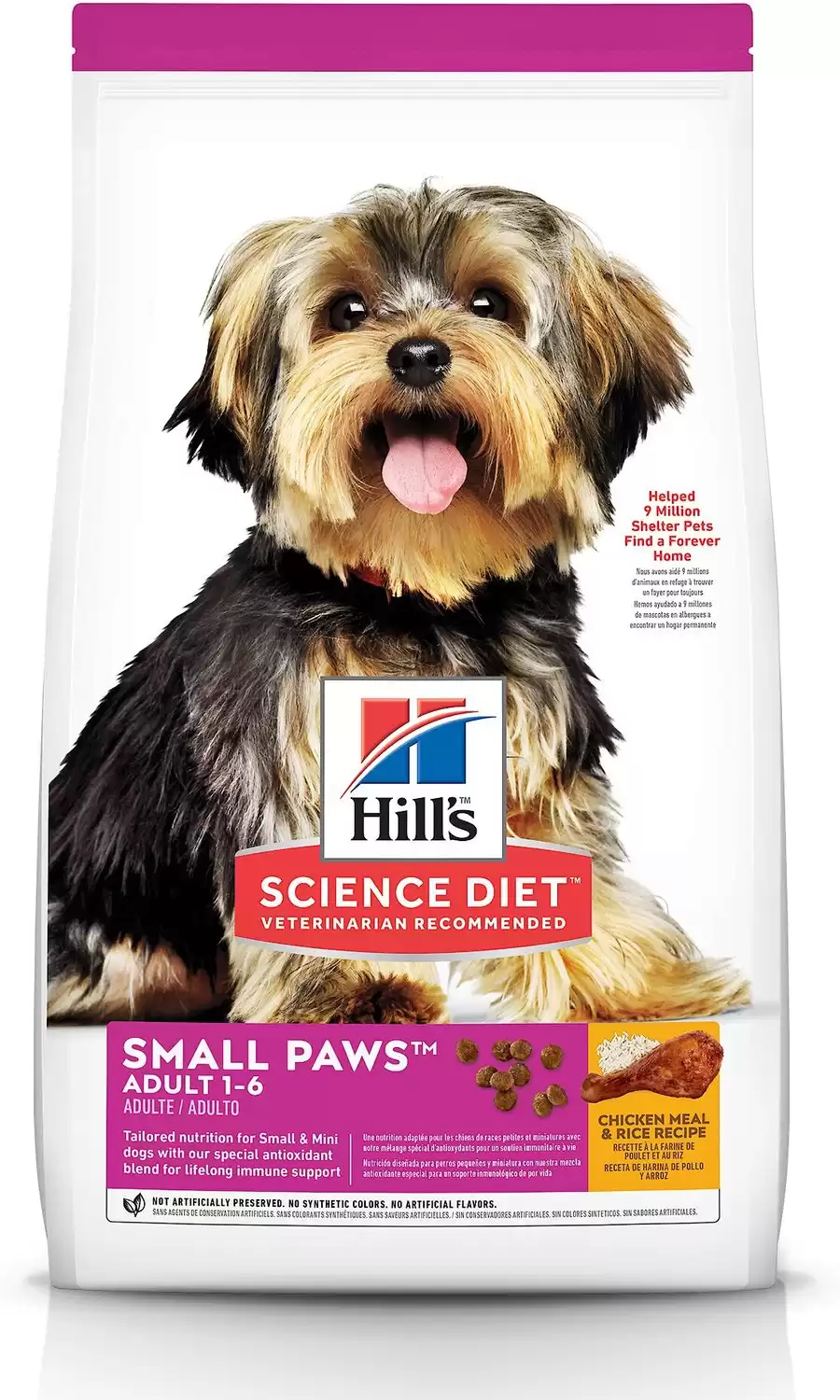Patterdale Terrier
Canis lupus
A Patterdale Terrier’s small body structure allows it to squeeze into fox burrows.
Advertisement
Patterdale Terrier Scientific Classification
- Kingdom
- Animalia
- Phylum
- Chordata
- Class
- Mammalia
- Order
- Carnivora
- Family
- Canidae
- Genus
- Canis
- Scientific Name
- Canis lupus
Read our Complete Guide to Classification of Animals.
Patterdale Terrier Conservation Status
Patterdale Terrier Facts
- Fun Fact
- A Patterdale Terrier’s small body structure allows it to squeeze into fox burrows.
- Temperament
- Strong and active
- Diet
- Omnivore
Patterdale Terrier as a Pet:
- General Health
- Energy Level
- Shedability
- Trainability
- Intelligence
- Tendency to Chew
- Size
- Family and kid friendliness
- Yappiness / Barking
- Moderate
- Separation Anxiety
- High
- Preferred Temperature
- Average climate
- Exercise Needs
- High
- Friendly With Other Dogs
- Moderate
- Pure bred cost to own
- $800
- Dog group
- Terrier
- Male weight
- 11-13 lbs
- Female weight
- 11-13 lbs
This post may contain affiliate links to our partners like Chewy, Amazon, and others. Purchasing through these helps us further the A-Z Animals mission to educate about the world's species.
View all of the Patterdale Terrier images!
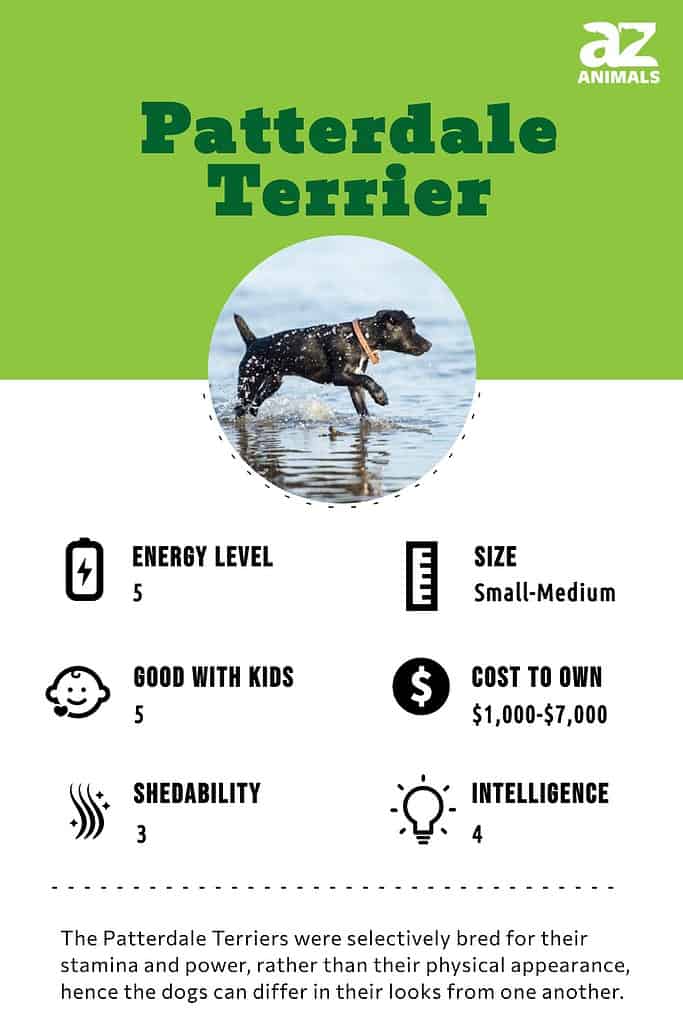
Patterdale Terriers have a strong, lean body that allows them to squeeze into fox burrows.
Patterdale Terriers are strong, friendly, and loyal dogs. This breed originates from Great Britain and dates back to the mid-20th century. Patterdale terriers were bred for fox hunting, meant to drive the fox out of its burrow.
See all of our expert product reviews.
The temperament of this dog is a mix of friendly and loyal, with occasional feistiness. Anyone interested in owning a Patterdale Terrier should know they are high energy and need regular daily exercise.
The 7 Different Types

©Sorrel Ireland/Shutterstock.com
The 7 different types of Patterdale Terriers and Patterdale Terrier mixes include:
- Pocket Pitbull
- Patterbea
- Patton Terrier
- Chatterdale
- Patterdale Shepherd
- Patterjack
- Patterland
Evolution and Origins
The Patterdale Terrier was first bred in the challenging Lakes Region of Northern England. It is thought by professionals that they have ancestral roots in the fell terrier, which is not a distinct breed, but instead, a collection of the working terrier breeds with long legs, originating from Great Britain.
The Patterdale Terrier’s lineage primarily traces back to the black, sleek-coated Fell Terrier, which was created in the challenging surroundings of Northern England. The Fell Terriers were employed to manage predators that preyed on sheep. They were selectively bred to either flush out the prey from their burrow or eliminate it if it resisted.
Health and Entertainment for your Patterdale Terrier
See all of our expert product reviews.
Additionally, the breed’s roots can be followed back to the crossbreeding of The Old English Terrier, which was the original black terrier, and the now-extinct Northumberland Pit Terrier. Later, it can be linked to the Lake District, especially to Ullswater Hunt’s leader, Joe Bowman, who was one of the initial Border Terrier breeders.
3 Pros and Cons of Owning a Patterdale Terrier
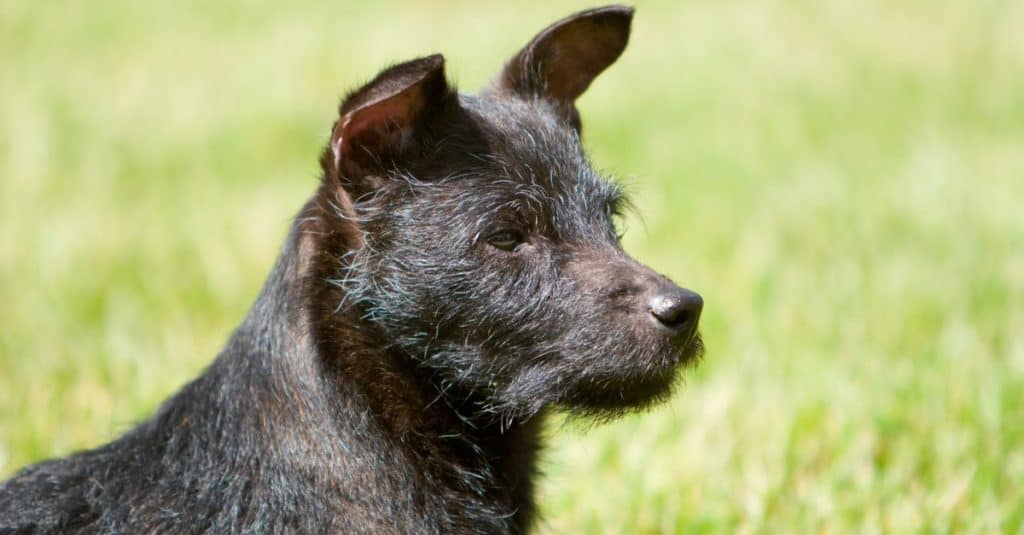
©JD/Shutterstock.com
| Pros! | Cons! |
|---|---|
| Loves to play Patterdale Terriers are playful and always ready for a game of fetch, chase, or hide ‘n seek with family members. | Needs lots of exercises It’s essential for the physical and emotional health of this terrier to get at least 60 minutes of exercise each day. |
| An effective watchdog These dogs are alert to activity in and around a home making them good watchdogs. | Moderate Shedding These dogs are sometimes miscategorized as hypoallergenic. In fact, they experience light shedding and need regular grooming attention. |
| Good with kids Socialized Patterdale Terriers are good with children in a family. | Prey driven This dog was bred to chase foxes and other prey out of their burrows. So, they need to be monitored around rabbits and other small pets in a household. |
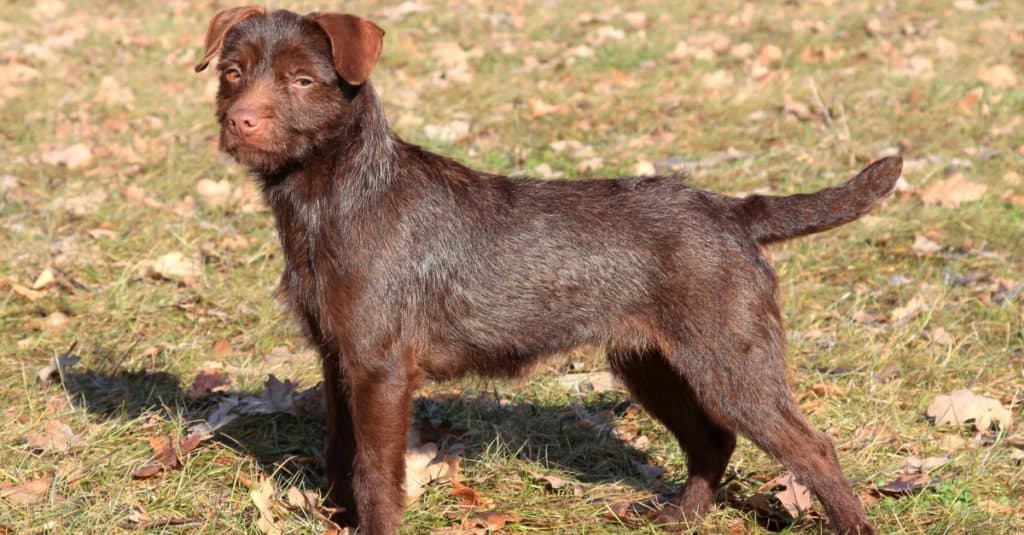
©Radomir Rezny/Shutterstock.com
Size and Weight
Patterdale Terriers are small in size with a coat of short hair. Males and females can grow to be 15 inches tall. Also, both males and females can weigh up to 13 pounds. At 9 weeks old, these puppies weigh from 2 to 3 pounds. They are full-grown at around 10 months old.
| Height (Male) | 15 inches tall |
| Height (Female) | 15 inches tall |
| Weight (Male) | 13 pounds, fully grown |
| Weight (Female) | 13 pounds, fully grown |
Common Health Issues
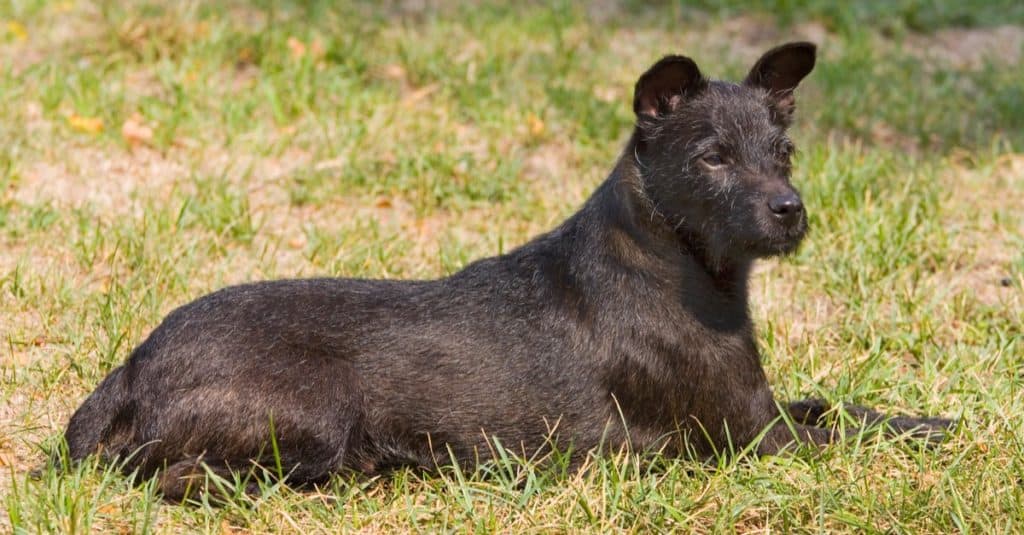
©JD/Shutterstock.com
The common health issues of Patterdale Terriers include:
- Hip dysplasia
- Obesity
- Cataracts
Patterdale Terriers experience common health issues, such as hip dysplasia. Hip dysplasia is caused by the hip joint not fitting together properly. Pain and limping are two symptoms of hip dysplasia. Surgery can be necessary to treat this condition, but it may also be treated through physical therapy or weight loss. The treatment depends on the severity and cause of the condition.
A second common health issue of Patterdale Terriers is obesity. Since these dogs are small in size, it is easy for them to gain excess weight if fed too much or not exercised properly. Obesity can lead to heart problems, joint issues, and other ailments.
A third common health issue is cataracts. Cataracts cause cloudiness in one or both of a dog’s eyes, obscuring vision. A cataract may cause partial or full blindness, corrected only by surgery.
Temperament and Behavior
Patterdale Terriers are generally friendly and loyal, making good guard dogs as they are protective and also a little feisty. Notably, these dogs have a very high energy level, excited to run and explore their environment. After all, they were bred to chase down foxes and other prey on hunting trips!
Socialized Patterdale Terriers are well-behaved around children as well as adults in a family. Though they like to be on the move, these dogs have also been known to snuggle on the sofa with their owner.
Because Patterdale Terriers bond so strongly with their owners, it is common for these dogs to develop separation anxiety when the owner is away. Separation anxiety may present as incessant barking or whining when left alone but can be as severe as household destruction. The best way to combat separation anxiety is by leaving your dog alone in a room for increasingly long increments of time while you are still in the house, making sure to keep loved, chewable toys in the room with your pet. Toys such as Kongs or Licking Mats filled with a tasty treat may help keep your dog distracted when you are away.
How to Take Care of Patterdale Terrier
It is always important for a dog owner to understand the grooming, diet, exercise, and health requirements of a breed before keeping a dog as a pet. Here are some tips for Patterdale Terrier care.
The Best Dog Food for Patterale Terriers
Puppies and adult Patterdale Terriers have different diets to address their unique nutritional needs. Check out some elements of this breed’s diet.
Patterdale Terrier puppy food: Tissue, muscle, joint, and cartilage growth are all supported by the lean protein in a puppy’s diet. Fat gives this active puppy a good supply of energy while Omega 3 and 6 fatty acids contribute to the healthy development of the puppy’s brain, vision, coat, and skin. These fatty acids can help to fend off cataracts in this breed. Calcium contributes to strong teeth, nails, and bones. Fiber supports proper digestion along with a fresh supply of water each day. Feeding a puppy 3 to 4 small meals each day can provide it with the energy it needs without overfeeding it. Owners usually do this until the puppy reaches 6 months old. After that, an owner feeds the dog one to two meals per day.
Patterdale Terrier adult dog food: Protein is an important part of an adult Patterdale Terrier’s diet. This nutrient keeps muscles and joints in good condition. Fat is essential in an adult dog’s diet, but it should be limited to avoid obesity in this small breed. Omega 3 fatty acids can help to fend off arthritis and maintain good cognitive function. Calcium keeps bones and teeth strong in an adult dog. Vitamin A contributes to healthy eyes which is especially beneficial in a dog prone to cataracts.
There are plenty of great dog food options to choose from for a Patterdale Terrier. At A-Z Animals, we recommend feeding your Patterdale Terrier Hill’s Science Diet Dry Dog Food, Adult Small Paws for Small Breed Dogs.
This small-breed dog food comes in little bites and provides taurine, omegas, riboflavin, calcium, and vitamins to keep Patterdale Terrier’s eyes and joints in great shape.
Check Chewy and Amazon for this product.
- Smaller kibble bites are easier to consume and digest
- Omega-6 fatty acids are a good choice for longer coats
- Includes antioxidants, as well as vitamins C and E for a robust immune system
Maintenance and Grooming
How much does a Patterdale Terrier shed? Though breeders sometimes refer to this breed as “hypoallergenic,” there is still a light amount of shedding. These terriers should be brushed once or twice per week.
A grooming glove is excellent for removing loose or dead hair from its coat. Moving the grooming glove in the opposite direction of the natural flow of hair is the best way to brush these dogs. This serves to loosen dead hair so it can fall out of the dog’s coat. Next, use the soft boar’s hair brush to smooth down the hair in the direction of its natural flow. The removal of dead hair gives this dog’s coat a refreshed look. A brush with soft boar hair bristles is also useful for renewing the natural shine of its coat.
Patterdale Terriers sometimes experience environmental allergies, presenting in the form of redness or dry patches on their skin. An owner who grooms their dog once a week has a good chance of noticing these symptoms right away. A veterinarian can provide treatment to a dog with environmental or food allergies.
Training
Patterdale Terriers are both intelligent and alert, making them fairly easy to obedience train. However, they can sometimes have a stubborn streak. It’s a good idea to limit obedience training sessions to about 10 or 15 minutes. This helps to prevent a Patterdale Terrier from becoming bored or distracted. A mix of praise and treats also proves helpful during training.
A Pit Bull Terrier is another intelligent terrier that understands obedience lessons relatively quickly.
Exercise
The opposite of a couch potato, a Patterdale Terrier needs to exercise every day to stay healthy and happy. Running in a field, playing chase in the backyard, or jogging in the woods are all great activities for this dog. Patterdale Terriers tend to get along well with other dogs, so the dog park is another great option for activity.
It needs at least 60 minutes of exercise each day. This amount of exercise also contributes to the emotional health of this dog.
While active breeds make for great companions, Patterdale Terriers are not a good choice for apartment dwellers. Though they are small in size, these energetic dogs need a lot of space to move around. A home with a large fenced-in yard or even a farm would be ideal choices for this breed of dog.
Puppies
Early socialization is also crucial for this breed. From a young age and after being fully vaccinated, socialization in the form of human and other dog and animal interactions helps reduce anxiety, fear, or distrust in the face of social interactions. Socialization helps bring out the fun personalities of these terriers and is beneficial if the dog comes in contact with children, other dogs, and strangers. Responsible breeders begin to socialize their Patterdale Terrier puppies right away so they’ll be ready to move on to their new homes.

©Sorrel Ireland/Shutterstock.com
Children
Socialized Patterdale Terriers are good for families with children but it is always important to educate children on proper approaching and handling techniques for dogs. These are sweet dogs that are eager to please!
Dogs Similar to Patterdale Terriers
Some dogs similar to Patterdale Terriers include Rat Terriers, Bull Terriers, and Norfolk Terriers.
- Rat Terriers – When it comes to height, Rat Terriers and Patterdale Terriers are about the same size. They both are known for light shedding and are not hypoallergenic. But, Rat Terriers have thicker bodies and weigh more than Patterdale Terriers.
- Bull Terriers – Bull Terriers and Patterdales are both energetic dogs with a stubborn streak. One big difference is the independent temperament of a Bull Terrier doesn’t make it a good choice for a family with children.
- Norfolk Terriers – These two terriers are about the same size though the Norfolk Terrier is shorter. They are lively canines that like hunting for small prey. But the Patterdale Terrier has a higher level of energy and needs more exercise than a Norfolk Terrier.
Popular Names
Popular names for Patterdale Terriers include:
- Cooper
- Toby
- Louie
- Stella
- Mia
- Penny
- Buster
- Coco
Patterdale Terrier FAQs (Frequently Asked Questions)
How much does a Patterdale Terrier cost to own?
Breeders charge around $800 for Patterdale Terrier puppies. A Patterdale Terrier rescue organization will have dogs that don’t cost nearly that much.
The yearly vet costs for this breed of dog range from $200 to $400. Keep in mind that as a dog grows older, vet bills are likely to increase with various ailments that arise.
The food budget for this dog can run from $50 to $75 a month.
Are Patterdale Terriers good with kids?
Yes, socialized Patterdale Terriers are good with kids.
How long does a Patterdale Terrier live?
A Patterdale Terrier can live to be 14 years old. Of course, this dog can live longer than 14 years if it’s given excellent care throughout its life.
Are Patterdale Terriers good pets?
Yes, these dogs make good pets. Of course, an owner should be willing to give this dog the exercise it needs each day.
Are Patterdale Terriers aggressive?
No, Patterdale Terriers aren’t known to be aggressive.
Is a Patterdale Terrier a Pit Bull?
No, a Patterdale Terrier is not the same as a Pit Bull. Pit Bulls are larger in both weight and height. However, the Pocket Pit Bull is a mix between a Pitbull and a Patterdale Terrier.
What breeds make up a Patterdale Terrier?
Patterdale Terriers are descendants of northern terriers including the Black Smooth-Coated Fell Terrier.
What is the lifespan of a Patterdale Terrier?
The lifespan of a Patterdale Terrier is 11 to 14 years.
Thank you for reading! Have some feedback for us? Contact the AZ Animals editorial team.
Sources
- Animal Health Center, Available here: https://animalhealthcenternh.com/client-resources/breed-info/patterdale-terrier/
- VCS Hospitals, Available here: https://vcahospitals.com/know-your-pet/hip-dysplasia-in-dogs





